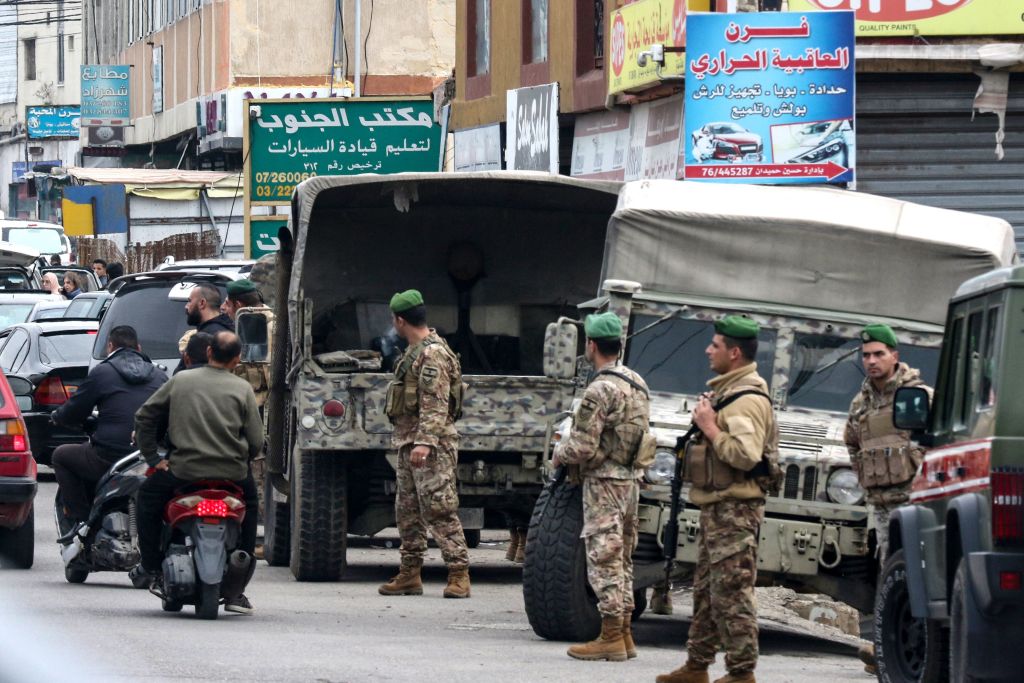An Irish soldier with the United Nations Interim Force in Lebanon (UNIFIL) was killed last week while on a peacekeeping mission in southern Lebanon. After taking a wrong turn, a “hostile crowd” reportedly swarmed his armored vehicle and shots rang out, killing the Irishman and wounding several other peacekeepers.
UNIFIL has maintained a presence in Lebanon since 1978, when skirmishes broke out between militants and the Israeli Defense Forces, and its size and mandate were expanded after Israel and Hezbollah fought a 34-day war in 2006. Among the force’s new tasks was enhanced coordination with the Lebanese Armed Forces (LAF). But the murder of the Irish soldier is just one indication that the UNIFIL-LAF security arrangement has failed. And much of the blame lies with Hezbollah and its influence over the Lebanese military and government.
According to UNIFIL, the details of last week’s incident remain “sparse and conflicting,” but UNIFIL says it is working with the Lebanese Armed Forces to “determine exactly what happened.” Wafiq Safa, Hezbollah’s “coordination and liaison officer,” claims the incident was “unintentional.” He told Reuters that Hezbollah was not involved and that official security organs should investigate the case. He stressed that the vehicle came under attack when it deviated onto a coastal road outside UNIFIL’s area of operations. A second vehicle took the usual highway and allegedly proceeded in peace.
Despite Safa’s denial, Hezbollah has an established track record of responding with hostility to what it decides are unauthorized UNIFIL movements. Neither UNIFIL nor the Lebanese Armed Forces have been able to put a check on Hezbollah’s military power. Worse still, the LAF regularly colludes with Hezbollah to cripple the U.N. force.
U.N. Security Council resolution 1701, which established a ceasefire between Israel and Lebanon in 2006, called for UNIFIL to assist the LAF in creating a buffer zone “free of any armed personnel, assets and weapons,” and authorized UNIFIL to “take all necessary action … to ensure that its area of operations is not utilized for hostile activities of any kind.”
However, as multiple reports from the U.N. secretary-general and various yearly U.N. Security Council resolutions make clear, Hezbollah has stymied these efforts through so-called “local villagers” or even through the LAF which, acting on Hezbollah’s behalf, has prohibited UNIFIL from accessing certain roads and sites.
In August, the U.N. Security Council renewed UNIFIL’s mandate and reaffirmed UNIFIL’s “freedom of movement” and operational independence, stating that “UNIFIL does not require prior authorization or permission to undertake its mandated tasks.” Hezbollah lambasted the Lebanese government for allowing this language into the resolution, and leader Hassan Nasrallah called the resolution “a violation of Lebanese sovereignty” and accused the Israelis of setting “a trap” for Lebanon. Immediately, UNIFIL reassured Hezbollah that it would not act without coordinating with the LAF.
Tellingly, the resolution itself notes how the LAF continues to obstruct UNIFIL’s mission. Specifically, the resolution expresses “increasing concern” that UNIFIL has yet to be granted access to Hezbollah’s cross-border commando tunnels that Israel began to uncover in December 2018.
U.N. Secretary-General Antonio Guterres also noted in a November report the LAF habitually obstructs UNIFIL’s movement, denying the peacekeepers access to the tunnels, firing ranges, and sites belonging to Green Without Borders—a registered environmental nonprofit that conducts reconnaissance for Hezbollah along Israel’s northern border. Green Without Borders also reportedly uses LAF observation towers in southern Lebanon.
The security arrangement is a failure of not only the U.N. but also of U.S. policy. Since 2006, the United States has pumped over $2.5 billion into the LAF. The U.S. also contributes substantially to UNIFIL’s $500 million annual budget. There is no reason the American spigot should remain open as the LAF obstructs UNIFIL and provides cover for Hezbollah. Policymakers might argue that the arrangement ensures stability and calm. But, as the attack tunnels alone indicate, this is a false stability.
Officials in Washington do not believe that UNIFIL or the LAF will mobilize against Hezbollah. Nor does the United States—or any troop-contributing country for that matter—want UNIFIL to challenge the status quo by crossing Hezbollah’s red lines. Instead, the United States has stripped UNIFIL of its counter-Hezbollah function and deployed the peacekeeping force in ways that are, at best, peripheral to its core mission. The recent Israel-Lebanon maritime-border demarcation talks are a case in point. Indeed, Lebanese officials conditioned negotiations on holding talks at UNIFIL headquarters. It should come as no surprise if UNIFIL is wielded next to push for land-border demarcation talks.
UNIFIL now functions like yet another U.N. aid and development agency. The Biden administration even enlisted UNIFIL to provide temporary aid to the LAF, including vehicles, food, fuel, and medical supplies. Other U.N. measures encourage further investment in the LAF, even as evidence has made it clear how LAF undermines UNIFIL’s mission.
The UNIFIL-LAF security arrangement has failed, and it’s a time for a course correction by the U.S.. For its part, Congress can exercise oversight and, short of real change, even defund UNIFIL and/or the Lebanese Armed Forces. Absent a wholesale change, Hezbollah will only grow stronger, making the specter of another war in the Middle East that much more likely.







Please note that we at The Dispatch hold ourselves, our work, and our commenters to a higher standard than other places on the internet. We welcome comments that foster genuine debate or discussion—including comments critical of us or our work—but responses that include ad hominem attacks on fellow Dispatch members or are intended to stoke fear and anger may be moderated.
With your membership, you only have the ability to comment on The Morning Dispatch articles. Consider upgrading to join the conversation everywhere.